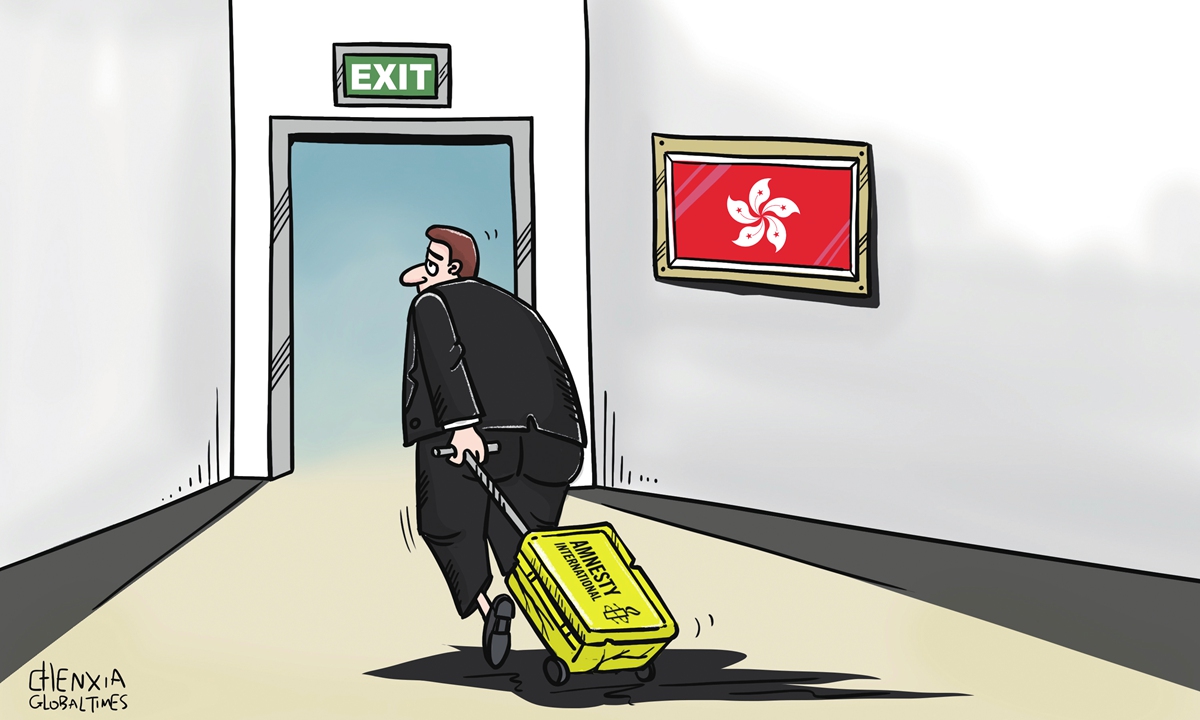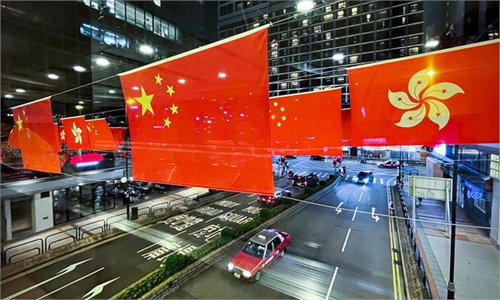
Amnesty International announced on Monday that it will close its offices in the Hong Kong Special Administrative Region (HKSAR) by the end of the year. Illustration: Chen Xia/GT
Amnesty International announced on Monday that it will close its offices in the Hong Kong Special Administrative Region (HKSAR) by the end of the year, according to media reports. Anjhula Mya Singh Bais, chairperson of Amnesty's international board, was quoted as saying that the decision "has been driven by Hong Kong's national security law which has made it effectively impossible for human rights organizations in Hong Kong to work freely and without fear of serious reprisals from the government."
Such remarks are just excuses. In fact, Amnesty's withdrawal is an independent decision made by the group after assessing the legal risks it may face. It is not the National Security Law for Hong Kong that prevents human rights organizations from operating normally in the city. Rather, Amnesty International violated the law by interfering in HKSAR affairs and inciting riots in the name of human rights. Amnesty International wants to avoid the scrutiny of the law in this despicable way.
After all, the previous grey areas are now all covered by the National Security Law, which has a deterrent effect on organizations like Amnesty International. Their announcement of withdrawal also proves that they do not comply with the law.
During the riots and violence two years ago, Amnesty International published a report which sensationalized Hong Kong police officers using excessive force against rioters. In June, Amnesty International said that the National Security Law has created a "human rights emergency" one year after its implementation.
What the National Security Law has brought about is not a human rights emergency in Hong Kong. It has prompted the violent forces that are disrupting HKSAR in the name of human rights to face a crisis. For these organizations, the tool of human rights is used to legitimize their politicization. Through their specific activities in Hong Kong, they have tried to instigate those violent forces and stigmatized the legal system of Hong Kong. Maliciously hyping up Hong Kong police's law enforcement activities has gone beyond the legitimate activities of human rights organizations. They have already become part of the forces that try to destabilize Hong Kong and undermine the central government. They are not entitled to say that they are innocent.
The Wall Street Journal reported that at least 35 groups have disbanded since the National Security Law for Hong Kong was enacted, including unions and activist groups. CNBC alleged that Hong Kong's status as one of the world's most prominent financial hubs appears to be under threat. This is the hypocritical double standards of Western media. They turned a blind eye to the institutional efforts of the central government and the HKSAR government to maintain Hong Kong's status as an international financial center. They are not qualified to discuss Hong Kong's freedom and openness. They do not have the credibility to judge whether Hong Kong is an international financial center. The first business environment report released by the HKSAR government on September 27 clearly explains the city's advantages at three levels. Capital tells no lie. The inflow of the global capital into Hong Kong in recent years proves there is no threat at all.
These human rights organizations withdrew because they could not meet the requirements of the law. These intrusive "international organizations" created under the Western system have no market in China anymore. They can no longer deceive people.
Western media accuse the National Security Law for Hong Kong of undermining Hong Kong's "freedoms." Yet they turn a blind eye to the fact that organizations, such as Amnesty International, are in essence political tools of some Western countries to interfere in Hong Kong affairs and mess the city up. Playing double standards is a tactic that the West often uses to promote "color revolution" and contain China's development. Western countries know very well the nature of those so-called human rights organizations. They are a part of the West's global policy tools and many of them receive funds from Western governments. That's why when they violate local laws and jeopardize stability of their location, some Western countries often play double standards and disregard their law violations.
Organizations such as Amnesty International are gradually losing their influence and discourse power in both China and other countries. When most countries and their people realize such double standards, it will mark the end of the "legitimacy of the Western hegemony."
The author is an associate professor at Beihang University and member of the Beijing-based Chinese Association of Hong Kong and Macao Studies. opinion@globaltimes.com.cn

